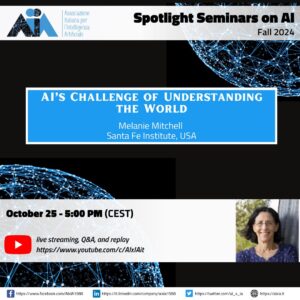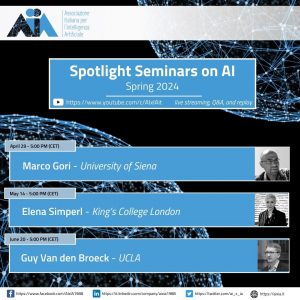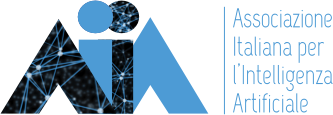Spotlight Seminars on AI – Spring/ Fall 2024
The Italian Association for Artificial Intelligence, in collaboration with the Society for the Study of Artificial Intelligence and Simulation of Behaviour (AISB), UK, is pleased to announce the Spring and Fall 2024 program of the Spotlight Seminars on AI.
The aim of the seminars is to illustrate, explore and discuss current scientific challenges, trends, and possibilities in all branches of our articulated research field. The seminars will be held virtually (https://www.youtube.com/c/AIxIAit), on a monthly basis, by leading Italian researchers as well as by top international scientists. The seminars are mainly aimed at a broad audience interested in AI research, and they are also included in the Italian PhD programme in Artificial Intelligence; indeed, AIxIA warmly encourages the attendance of young scientists and PhD students.
The “Fall 2024” edition features 2 seminars:
- Melanie Mitchell, Santa Fe Institute, USA
- October, 25 – 5:00PM (CEST)
- Title: AI’s Challenge of Understanding the World
- Abstract: I will survey a debate in the artificial intelligence (AI) research community on the extent to which current AI systems can be said to “understand” language and the physical and social situations language encodes. I will describe arguments that have been made for and against such understanding, hypothesize about what humanlike understanding entails, and discuss what methods can be used to fairly evaluate understanding and intelligence in AI systems.
- Bio: Melanie Mitchell is Professor at the Santa Fe Institute. Her current research focuses on conceptual abstraction and analogy-making in artificial intelligence systems. Melanie is the author or editor of six books and numerous scholarly papers in the fields of artificial intelligence, cognitive science, and complex systems. Her 2009 book Complexity: A Guided Tour (Oxford University Press) won the 2010 Phi Beta Kappa Science Book Award, and her 2019 book Artificial Intelligence: A Guide for Thinking Humans (Farrar, Straus, and Giroux) was shortlisted for the 2023 Cosmos Prize for Scientific Writing.

- TBA
- TBA – 5:00PM (CEST)
- Title: TBA
- Abstract: TBA
- Bio: TBA.

The “Spring 2024” edition featured 3 seminars:
- Marco Gori, University of Siena
- April, 29 – 5:00PM (CEST)
- Title: Consciousness and Laws of Learning
- Abstract: The fields of Artificial Intelligence (AI) and Cognitive Science began crossing their paths significantly during the Eighties when the Connectionist wave strongly pushed the studies on Artificial Neural Networks. The evolution of the last decades in AI with the focus on deep learning and, recently, on generative AI, has been producing spectacular results that were hardly predictable even by the fathers of the discipline. However, when looking at early studies on Connectionism, most dreams are still waiting to be realized, since most successful results rely on the brute force coming from joining computational resources and large data collections. This is far away from what we observe in Nature, where cognition emerges simply from environmental interactions while processing temporal information. In order to capture those natural processes and prospect an alternative path to Machine Learning, in this talk I give a preliminary view of cognitive systems whose environmental interactions are dictated by genetic features that are translated into the minimization of an objective functional over time. This functional, that is referred to as the cognitive action of the system, replaces the classic Machine Learning statistical functional risk. I use the apparatus of Theoretical Physics and Optimal Control to derive unified laws of cognition for learning and inference and show that Hamiltonian equations in their causal dissipative form approximate the optimal solution over the entire data collection of the agent life. This comes from imposing the evolution on a Hamiltonian track which gives rise to a computational scheme for both focus of attention and conscious actions.
- Bio: Marco Gori is full professor of computer science at the University of Siena and 3IA chair at Université Côte d’Azur, Nice (MAASAI lab https://team.inria.fr/maasai/team-members/). His research interests are in the field of artificial intelligence, with emphasis on machine learning, vision, and game playing. In the last few years, he has been mainly involved in the unification of computational processes of reasoning and learning, driven by the principle that the the emergence of cognition is rooted in natural laws of computation. He also very much like discussions on novel models of computation and their relationships with human brain.
- Elena Simperl King’s College of London
- May, 14 – 5:00PM (CEST)
- Title: Fostering responsible AI with MLCommons
- Abstract: MLCommons is a not-for-profit organisation that fosters responsible innovation in machine learning and AI. It brings together researchers and practitioners from academia and industry from over 125 organisations worldwide. Volunteers participate in working groups that develop high-quality benchmarks and evaluation approaches; curate datasets that are critically missing in the ecosystem; consolidate best practices and guidance across the AI development and deployment lice cycle; and share knowledge, resources, and expertise.
- Bio: Elena Simperl is a Professor of Computer at King’s College London and the Director of Research for the Open Data Institute (ODI). She is a Fellow of the British Computer Society and the Royal Society of Arts, and a Hans Fischer Senior Fellow. Elena’s work is at the intersection between AI and social computing. She features in the top 100 most influential scholars in knowledge engineering of the last decade and in the Women in AI 2000 ranking. She is the president of the Semantic Web Sciences Association.
- Guy Van den Broeck, UCLA
- June, 20 – 5:00PM (CEST)
- Title: TBA
- Abstract: TBA
- Bio: TBA.
